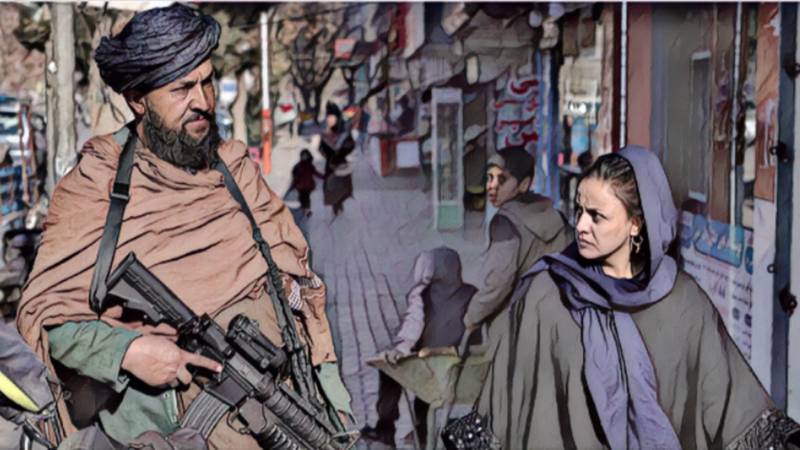
The Taliban are back in power in Afghanistan since 2021 after the hasty departure of US forces. So far, not a single country in the world has recognised the Taliban government in Kabul and ironically it was only the then Prime Minister of Pakistan Imran Khan who welcomed the return of the Taliban, and said, that “they have broken the shackles of slavery.” The Islamic Emirate of Afghanistan has alienated the entire world community by refusing to listen to reason and respect the rights of women and minorities in Afghanistan. It is not only the Europeans and Americans who want the Taliban to allow the Afghan girls the basic right to education, but also close neighbours like Pakistan, Iran and China have demanded the same.
Currently in Afghanistan, women are not allowed to attend school beyond grade four and they cannot move around in public spaces unless they are in the company of a male relative called a mahram. In general, they are only allowed to leave their house for urgent matters and have to wear full veils if they do. Women who flout the dress code put their male relatives at risk of imprisonment.
Since December 2022, the Afghan government has prohibited university education for women and prevented them from employment in NGOs. Beauty salons have been shut down and women’s entry in gyms and parks is prohibited. The treatment of women by the Islamic Emirate has been called gender apartheid by the United Nations. The community of nations has repeatedly emphasised that we cannot accept the exclusion of women from education and employment but so far the Taliban Government has refused to listen to any voice of reason. And UN Secretary-General Antonio Guterres articulated that convergence on the issue in an emotional but unequivocal terms:
“It would be unconceivable for me if my (three) granddaughters would not be able to attend secondary school, if they would not be able to go to the university, and if they would not be able to have the chance to fully participate in the economy and the society of my country,” Guterres told the post-meeting news conference.
He also acknowledged that the issue amounts to a literal stumbling block in the way of economic-humanitarian assistance for millions of needy Afghans, representing a to-engage-or-not-to-engage challenge with a regime in Kabul that apparently expects the world to adapt itself according to the Taliban social view vis-a-vis human rights, women’s rights and education for girls.
In the Taliban’s first press conference after taking Kabul in August 2021, spokesperson Zabihullah Mujahid said that the Taliban were “committed to the rights of women within the framework of Shariah” and that the group would not discriminate against women. While the Taliban have made similar claims in the past, these words quickly proved hollow. Indeed, immediately after seizing power the Taliban prohibited girls from attending secondary schools and transformed the Ministry of Women’s Affairs, tasked with safeguarding women’s rights in all 34 provinces, into the ironically titled Ministry for the Prevention of Vice and Promotion of Virtue. This marked the beginning of a string of more than 140 orders and decrees that have thoroughly dismantled all existing mechanisms, laws and institutions that were put in place to protect against human rights violations and promote women’s rights.
Even three years after the Taliban takeover of Afghanistan, the human rights and women’s rights situation in the country leaves a lot to be desired, with women and young girls at the mercy of the archaic policies of the Taliban. There is a mountain of evidence that the Taliban regime is guilty of committing crimes against humanity in the form of gender persecution of women and girls and this has been stated clearly by Human Rights Watch in their latest reports.
The World Economic Forum ranked Afghanistan as 146th, that is, last on its gender gaps study. In fact, the WEF said further that the Taliban’s “large-scale systematic violations of women’s and girls’ fundamental rights in Afghanistan … [constitute] gender persecution and an institutionalised framework of gender apartheid.”
The scope of the Taliban’s women’s rights restrictions is truly unprecedented. For instance, they have renamed the office of the Attorney General and it is now called the General Directorate for Monitoring and Follow up of Decrees and Directives. Institutions like the Afghan Independent Human Rights Commission, the Commission to Eliminate Violence against Women, Shelter and Safe Houses for battered Women and the Protection and empowerment programs and all women led organisations have been wrapped up. They also rescinded laws and policies geared toward eliminating violence and harassment against women. Just after four months of their rule they made it clear that they are not going treat women any different than they did during their first stint in power in the 1990s under their chief Mullah Omar.
Today a woman cannot travel even a short distance without a male Mahram: women are banned from all forms of employment. The education system is being transformed into the madrassa form of education. The curriculum is now revised in accordance with the Taliban’s narrow minded obscurantist interpretation of Islam: students are being forced to attend madrasas rather than public schools and new Jihadi Madrassas are being opened to provide boys with military and Islamic teachings.
Afghan women are not prepared to concede all that they had achieved over the last two decades. Many have bravely gone to the streets to demand their basic rights despite being met with Taliban violence and repression. While most public protests have largely subsided, they have been replaced with indoor protests with women and girls holding signs in Dari, Pashto and English rejecting Taliban policies. Outside the country, women have issued statements, launched media campaigns and even conducted hunger strikes to urge world leaders and the UN to recognise the Taliban’s gender apartheid and hold the regime accountable for crimes against humanity.

